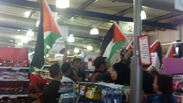
NEW YORK - The Presbyterian Church (USA) appears to be on the brink of handing a major victory to a movement that wants institutions to wield their investment dollars against Israel over its treatment of the Palestinians.
The Presbyterian General Assembly, gathering in Detroit through next week, will consider withdrawing its investments from some companies whose products are used by the Israeli government in the Palestinian territories.
Divestment advocates were narrowly outmaneuvered at the last Presbyterian convention in 2012, losing a crucial ballot by just two votes. They enter this year's fight with signs of increasing momentum, within and outside the church.
Related stories:
- The useful idiots of the BDS campaign
- Growing concern in Israel over BDS
- BDS movement urges Rolling Stones to cancel Israel show
"I remember in 2006, the use of the word 'occupation' in General Assembly circles - it was like using a bad word. You just didn't say it and when you said it sounded outrageous," said the Rev. Jeffrey DeYoe of the Presbyterian's Israel Palestine Mission Network, which advocates for Palestinians. "We've come a long way from there."
Presbyterian national assembly's have for a decade considered adopting some type of sanctions over Israeli treatment of the Palestinians. In 2004, delegates voted overwhelmingly to start "phased, selective divestment" of corporations operating in Israel, then in later meetings took a step back, apologizing for the hurt they caused Jews.
Still, delegates continued criticizing Israeli policy in official resolutions, and at the 2012 convention, came within two votes of directing the church to divest. The 2012 delegates did win enough votes to call for a boycott of Israeli products manufactured in the Palestinian territories.
The broader movement known as BDS - which stands for boycott, divestment and sanctions against Israel - has scored some successes in Europe and elsewhere, but has had far less influence in the United States, Israel's closest and most important ally. However, the boycott campaign is gaining some ground in America, with small but symbolic victories meant to pressure Israel to stop building settlements in the West Bank and east Jerusalem and end the occupation.
Last year, the American Studies Association, with about 3,800 members, and the Association for Asian American Studies, which has about 800 members, became the first scholarly groups in the US to support an academic boycott of Israel. Still, the larger and more prominent Modern Language Association, with 23,900 members, this month rejected a resolution critical of Israel.
Among US religious groups, the Mennonite Central Committee and a firm that manages assets for US Quakers has divested holdings in some companies in protest over Israeli policy. And this week, the pension board of the United Methodist Church, the largest mainline Protestant group in the US, revealed plans to sell its holdings in the company G4S, which provides security equipment and has contracts with Israel's prison system, said David Wildman of the church's General Board of Global Ministries.
The stock is worth about $110,000. G4S said on its website that it has conducted reviews of its business in Israel related to human rights and has concluded the company hasn't caused or contributed to any human rights violations.
George Douglas, a Presbyterian elder on the steering committee of Presbyterians for Middle East Peace, which opposes divestment, said he was deeply worried that a vote for liquidating stock would align the Presbyterian church with the BDS movement, which he said doesn't fit with the traditional Presbyterian and Christian idea of peacemaking.
"It's become more and more clear that the BDS movement is hostile to Israel and does not support a two-state solution," Douglas said. "If you vote for divestment, you place the church in the BDS camp."
The Presbyterian Church (USA) is among the many liberal-leaning Protestant denominations that were once at the center of American religious life but have been losing members and influence for decades. As of last year, the denomination had just under 1.8 million members.
Still, the denomination is historically important within the US and works closely with Presbyterians worldwide, and would be the most prominent American religious group by far to support divestment. The stocks that would be targeted in the latest proposals before delegates are in Caterpillar, Hewlett-Packard and Motorola, and are collectively valued at about $21 million, according to a church spokeswoman.
Advocates on all sides of the debate say the lobbying ahead of the vote has intensified this year. The proposals will be debated in committee hearings early in the week, then will be sent to the full General Assembly for more discussion and a final vote some time before the event ends next Saturday.
Rabbi Rick Jacobs, head of the Union for Reform Judaism, which represents the largest American Jewish movement, said the Presbyterian meeting will be "a moment for us to counter the narrative of the BDS community."
"This vote will have wider repercussions," said Jacobs, who will be in Detroit for the event. "This is a debate for the very fundamental legitimacy of the state of Israel.















